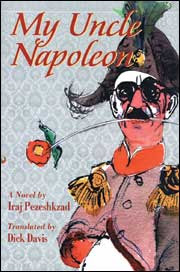Wodehousian comic fiction from Iran? It can't be true, can it? Well that's what led me to pick up "My uncle Napoleon" a book by Iraj Pezeshkzad touted as the most important and best loved novel by Iranians since World War II. These days when nothing even remotely funny is heard from Iran (i.e if you ignore the late night comics and their commentary on Ahmadinajad) it was heartening to know that there is still room for a lot of laughter and mindless slapstick comedy in Iran. The book was written before the Iranian revolution and was briefly banned following it, but has apparently remained popular over the years and one can see why.
The plot is fairly straightforward and is set during the Allied occupation of Iran during Second World War. It is the story of a family patriarch ("Dear Uncle") who likens himself to Napoleon (yes the one who met his nemesis at Waterloo in the hands of the British) and rules his family with an iron hand. The narrator who is nameless has the misfortune of falling in love with his cousin Layli (Dear Uncle's daughter) on the 13th of August at a quarter to three precisely, at a time when the relationship between the two families was to say the least, strained. With the narrator's father and Dear Uncle scheming against each other, the narrator turns to his Uncle Asadollah a complete charmer who is quick witted and has the knack of putting his so called noble family in uncomfortable situations. Layli's marriage has been arranged to Puri who is another cousin and the son of Uncle Colonel and the narrator along with Uncle Asadollah tries to delay this inevitable event as much as they could. Events get complicated as Dear Uncle becomes paranoid that the English (whom he hates and blames for everything that is wrong in Iran) were out to get him.
Bizarre situations, complex confusing plots, over the top catch phrases that are sexual euphemisms ("going to san francisco", "noble member") all surprisingly work (although as a woman i found it a bit bawdy and sexist, but am willing to overlook as it was written over 50 years ago) as they not just add to the fun but actually reveal the complicated society in which the characters operate. In a typical Wodehousian fashion a motley crew of characters in supporting roles are crucial to the comical farce.
I can't claim to have understood Iranian culture and society from this book just as I cannot claim to understand the British from the works of Wodehouse. For that, I prefer Majid Majidi's movies which i absolutely adore! But in a week when i was hit by a nasty cold, this was quite an antidote as i am sure i could not have handled any heavy literature with a runny nose and a throbbing head.
The plot is fairly straightforward and is set during the Allied occupation of Iran during Second World War. It is the story of a family patriarch ("Dear Uncle") who likens himself to Napoleon (yes the one who met his nemesis at Waterloo in the hands of the British) and rules his family with an iron hand. The narrator who is nameless has the misfortune of falling in love with his cousin Layli (Dear Uncle's daughter) on the 13th of August at a quarter to three precisely, at a time when the relationship between the two families was to say the least, strained. With the narrator's father and Dear Uncle scheming against each other, the narrator turns to his Uncle Asadollah a complete charmer who is quick witted and has the knack of putting his so called noble family in uncomfortable situations. Layli's marriage has been arranged to Puri who is another cousin and the son of Uncle Colonel and the narrator along with Uncle Asadollah tries to delay this inevitable event as much as they could. Events get complicated as Dear Uncle becomes paranoid that the English (whom he hates and blames for everything that is wrong in Iran) were out to get him.
Bizarre situations, complex confusing plots, over the top catch phrases that are sexual euphemisms ("going to san francisco", "noble member") all surprisingly work (although as a woman i found it a bit bawdy and sexist, but am willing to overlook as it was written over 50 years ago) as they not just add to the fun but actually reveal the complicated society in which the characters operate. In a typical Wodehousian fashion a motley crew of characters in supporting roles are crucial to the comical farce.
I can't claim to have understood Iranian culture and society from this book just as I cannot claim to understand the British from the works of Wodehouse. For that, I prefer Majid Majidi's movies which i absolutely adore! But in a week when i was hit by a nasty cold, this was quite an antidote as i am sure i could not have handled any heavy literature with a runny nose and a throbbing head.

